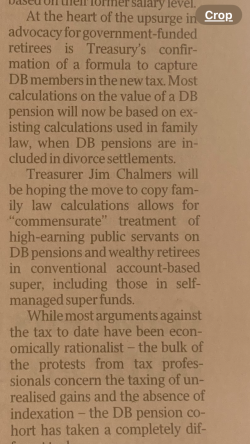CaptJCool
Established Member
- Joined
- May 31, 2012
- Posts
- 4,597
Todays Oz has an articleThanks didn't see that bit, depressingly I think it's proposed that defined benefit "value" does effect ones liability for extra 15% tax , as page 6 example 1.21 refers to "Total" super balance, and total super balance includes value of defined benefit.
To take an extreme example for clarity, if a retired person's defined benefit Value was $3m, and one had just $100 earnings in another super fund, then proposed div 396 applies. So a more likely example, lesser pension and higher (other) super account will effect many. As I read it, if you have a significant defined benefit value it can push a modest (other) super account into 396
And does the Defined benefit Value change each year as one's pension increases, or decreases as one ages? I can't see the history of my defined benefit value unfortunately, but if it does then it would affect the % of your earnings that are taxed at 30%.
I hope I'm wrong.
On page 19
Extract

The family law calculations formula are here
FAMILY LAW (SUPERANNUATION) REGULATIONS 2001
Last edited:













